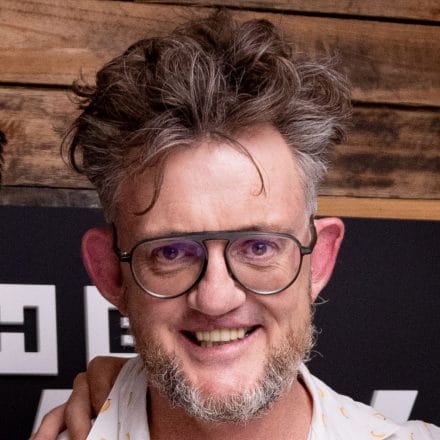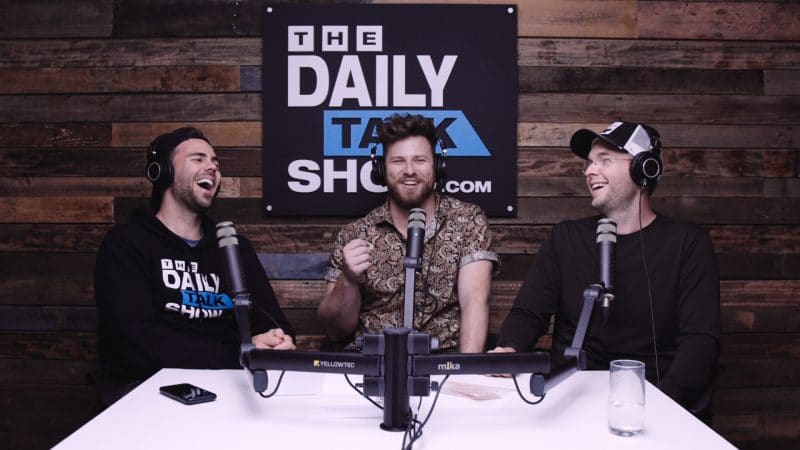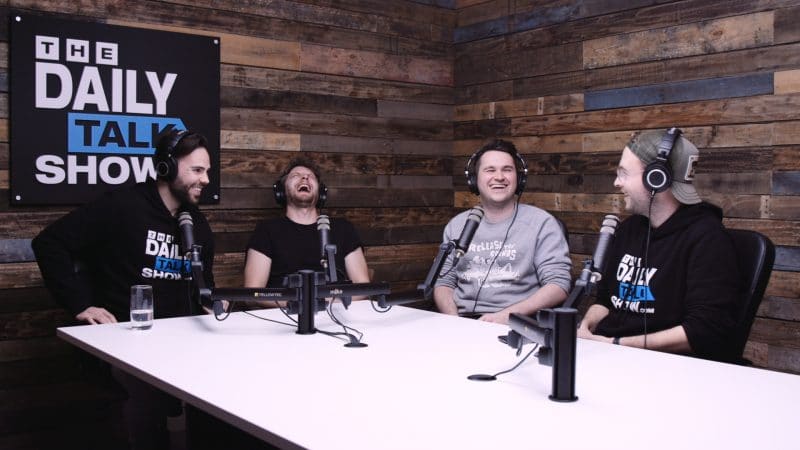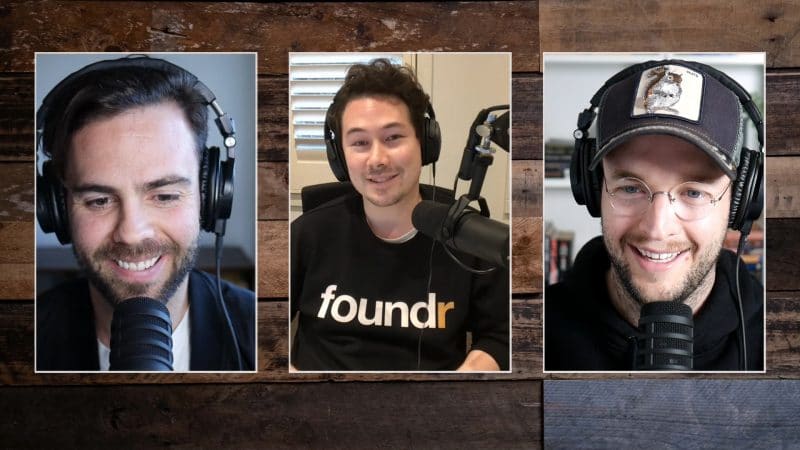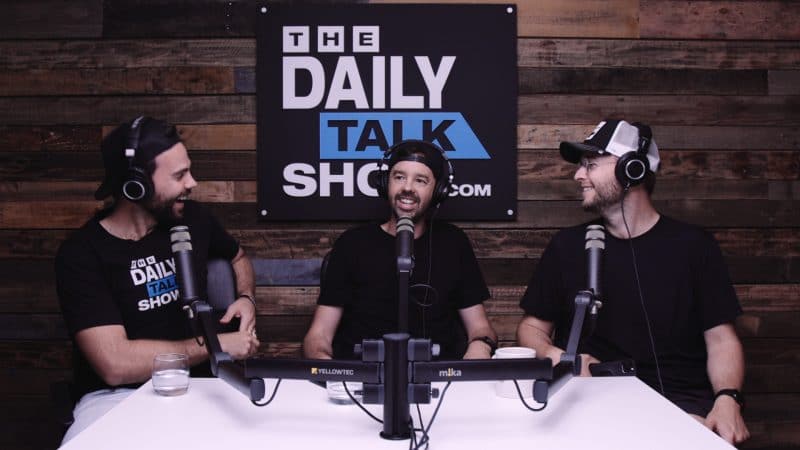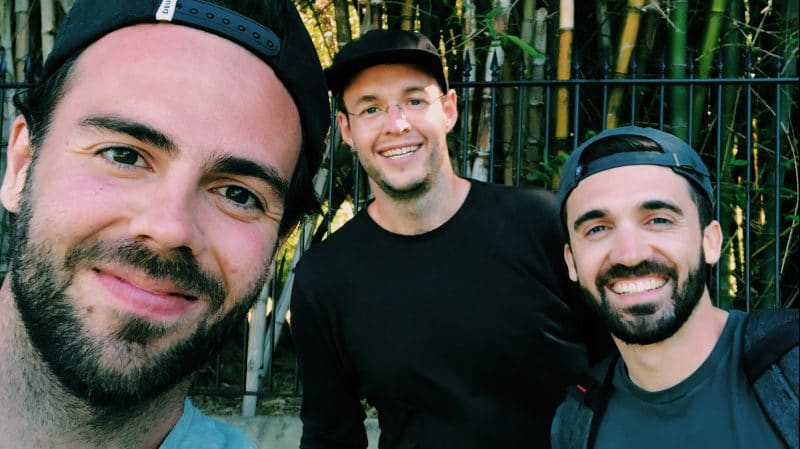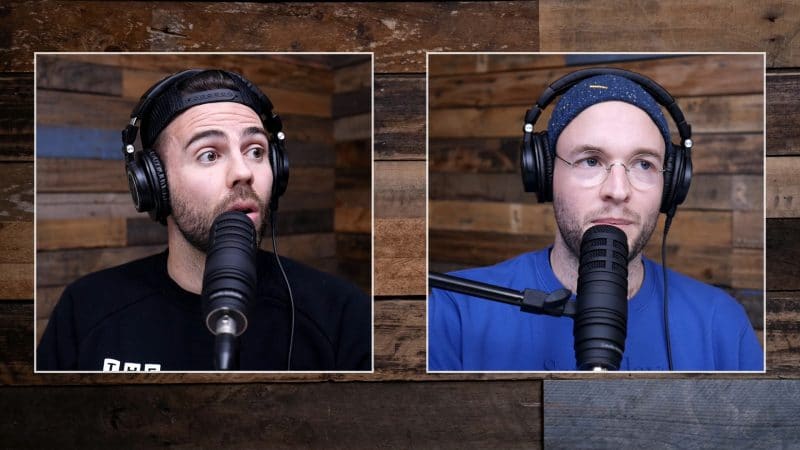#649 – Michael Bungay Stanier On Self-Management/
- March 26, 2020
MBS is back and joins us live from Toronto, Canada! We chat about coaching in a time like this, self-managing, remote work and whether everyone can be creative.
On today’s episode of The Daily Talk Show, we discuss:
– Coaching in a time like this
– Self-Management
– Being responsible for other people’s thoughts
– Career progression
– Oblique strategies and launching The Advice Trap
– Creativity
– Remote work
– Michael’s biggest challenge
Michael on LinkedIn: https://www.linkedin.com/in/michaelbungaystanier
Buy The Advice Trap: https://www.thebookroomatbyron.com/p/business-the-advice-trap-be-humble-stay-curious-change-the-way-you-lead-forever–6?barcode=9781989025758
Email us: hi@bigmediacompany.com.au
Send us mail: PO BOX 400, Abbotsford VIC 3067
The Daily Talk Show is an Australian talk show and daily podcast by Tommy Jackett and Josh Janssen. Tommy and Josh chat about life, creativity, business, and relationships — big questions and banter. Regularly visited by guests and gronks! If you watch the show or listen to the podcast, you’re part of the Gronk Squad.
This podcast is produced by BIG MEDIA COMPANY. Find out more at https://bigmediacompany.com/
0:03
It's the daily Talk Show Episode 649. And we've got a guest with us who is jumping the gun on our Friday night drinks. Michael bungay stanier how are you mate? awesomely Well, thank you. Thanks for having me back. Well, technically, it's Wednesday where you are. So that's right. If you just keep drinking into the wee hours of the morning, you'll be able to find out now the 36 hours and I'll join you for Friday night drinks. So that sounds like it's an unsustainable goal, but I'm prepared for anything. Well, we're sticking to the rules of 1.5 metres. You're about 10,000 miles away from us right now. How's it how's it going over in Canada, buddy? Oh, you know, it's, uh, it's our own different version of zombie apocalypse. So it's, it's,
0:52
I mean, no seriousness. It's tower ball. Um, I think we're a little ahead of Australia in terms of
1:01
Thinking about how we manage it because there's a, my parents four days ago wrote an email going, Okay, we're going to take this self isolating thing seriously. So we're only going to have picnics with our friends on the lake. And we're going to drive the kids to school and we're going to and I was like, okay, on the email with my mum and dad going Actually, let me explain what self isolation really means. It doesn't mean driving the kids to school. That's like the best possible thing. So it feels that I mean, this thing is moving so fast, and governments must be scrambling to try and find the appropriate level of response. But it feels like Canada's perhaps like 48 hours ahead of Australia a little bit in terms of making decisions about the next thing we need to shut down to the next kind of draconian piece of legislation we need to introduce.
1:51
Michael, I've got to say that the workshop that we did with you I know I probably mentioned this when we last had you on but it has
2:00
Been like the had the biggest impact on my life in regards to things that I've done in the last 10 years.
2:07
And even especially in this time where it is it's so easy to fall into that sort of triggered mode of giving advice or telling people they need to be doing and evangelising.
2:23
Where does where does coaching fit in a crisis? That's a huge and perfectly phrased question. So Thanks, Josh.
2:34
So I just think that it's useful to understand what your brain is doing in a crisis, which is give me certainty. That's what your lizard brain is going is like, you're going to hell. The thing that I want, the company I'm looking for is certainty. And it means that you feel better when you're giving advice and you feel better when you're getting advice. So there's just that rush to look, the advice might be terrible. It might be
3:00
Wrong, it might be inappropriate, but I'm still hungry for it. It's that kind of the it's, it's why strong leaders show up in a time of crisis because in one thing they chose they go, I am letting me be absolutely clear. And as soon as they say, let me be absolutely clear, he goes, Oh, this is great. I didn't know what you're going to say. But I already feel better, because you're going to be absolutely clear about it.
3:23
And there is absolutely a place for clarity of direction, certainty. You know, if you if you go back to Dan Goleman article in the Harvard Business Review in the year 2000. He says, leadership that gets results. And he says, here's the deal. There are actually six different leadership styles. And they all have their moments. They all have a time where they're the appropriate ones to be used. Some are more directive, some are more democratic. Some are more coach, like some are more. You know, there's a range of different ways you can show up and lead people.
3:57
great leaders know how to use
4:00
Six at the right, you know, at the appropriate time, because every choice you make has prizes and punishments.
4:08
Typical leaders, average leaders use one or two or maybe three of those six leadership styles. So, if you're a leader right now, or if you're a leader, I mean, a human being who interacts with other human beings. So you don't have to have a formal leadership position. It's just a you showing up with people. What I think you want to be asking yourself is what's the right mix for me around giving clarity around giving direction? And around staying curious? Because you know, Josh, and Tommy and Mr. 97, as we talk about all of this stuff, and I go, here's what I'm trying to teach. In the end where I'm trying to teachers, can you stay curious a little bit longer. And I just think there is a place for curiosity and space, to allow people to show up and try and figure out what's going on for themselves.
5:00
I mean, some of the most used questions in our office now. What else? What's the biggest challenge? What's the biggest problem? Is there any questions that you were dropping out of your repertoire based on the current situation?
5:15
You know, I think there are, I would say there are questions I find myself wanting to ask more.
5:21
So one of the questions I would ask is, what do I know? What do I know to be true?
5:30
Because one of the things that happens at the moment, is, there's so much speculation going on, that we can get caught into the swirl of all of that, and it can make us really anxious. You're like, okay, I've heard this. Well, I've heard that. Well, I've heard this. And you know, I've heard it three times now. So it must be true.
5:53
And what I would say is that, that question around, what do I know to be true? How
6:01
move you towards shifting out data from speculation and judgement and opinion and kind of interpretations of data. And
6:13
we're in a difficult place because actually, nobody's quite sure of the data because that's moving so fast. So, you know, what you heard from scientists two days ago might be different 48 hours later, you know, we don't yet know, at least in Canada, we don't know. I don't think it's true in the US. And I suspect this is true in Australia, we don't really know how many people have died. We don't really know how many people are infected. We don't really know how many people are now unemployed. And that that's data that we're hungry for, we're trying to make up. But I do find that question, Where do I need? What do I know to be true?
6:50
is a really important one. And then the other question that I'm trying to ask myself and asking my team is what's what's the most important thing to focus on?
7:01
Because, you know, there is
7:06
this this hunger to go, I've just try and do I just try and chase after everything and run after everything because it's anxiety. No, it's a natural response. And
7:17
as I look at for instance, how Shannon who's the CEO of Box of Crayons is leading box of crayons, she's like, the most important thing is that we make that transition completely to a company who can deliver distributed and virtual training. That's it. That's priority number one. There actually isn't a priority number two, is that no, I've reassured you around what I can tell you to be true, which is you have your jobs in your safe for another six months or longer. But that's that's the priority. And for the little company that I've spied off and is now the thing I focus on outside box of crayons, which is NBS dot works, you know, NZ, and I
8:01
asking ourselves, okay, what's the most important thing? Because there's a bunch of things we could do. But it feels now more than ever. You've got to focus on the critical few and not get seduced into the trivial many. And that's perhaps a useful question to keep asking yourself and your team and your family around what needs to be what needs to happen here. I feel like I've definitely struggled with being coach like to the point where Tommy will in a conversation, say, I'm just gonna ask myself what the biggest challenges here and he'll self coach, do you have?
8:39
Do you have any mechanisms?
8:41
In this specific time where people are spending more time on their own or they might be late they might be leaders that are needing to make big decisions where they don't have their regular people around them. How can you approach self coaching
9:00
Well,
9:01
I think that even though we're self isolating, physically isolating, it doesn't mean you have to socially isolate. I mean, this is a perfect example of connection. You know, you guys reached out two or three days ago and said, Hey, can we do this? I'm like, for sure. And the thing I did before this was
9:21
I'm calling it the cop cows in question saloon. So I have a I have a broad network of what I would call weak ties and weak cases or social psycho same psychology phenomenon, which is, you have you have strong ties, which of the people in your close network people you know, you're hanging out with you kind of you're friends with them. And then there are weak ties, where you know them a little bit like I would say that the three of you are weak ties with me. We know each other a little bit. We've we've done something together in the past, but you're not going to invite me to your wedding, or family birthday. Can't have weddings at the moment.
10:01
Also reason you won't invite me to your wedding because there are no way.
10:05
But weak ties are often an indicator of a strength of a network. Because it's actually through your weak ties that you find a path to another job or to a resource you're looking for, or whatever it might be. So I have a bunch of weak ties, and it means people who don't know each other. So every day or three days a week, Tuesday, Wednesday, Thursday evenings, 5pm. I invite people to come and hang out with me on zoom.
10:34
So it's seven pick no more than seven people.
10:39
And often, and I can't just have seven slots available and I put it out to my network and people sign up. So I don't entirely know who's going to be there. So it's serendipity as to who shows up and know often people will know one or two people, but they won't know all the people. And what I do is I just host a conversation. I'm like
11:00
cocktail, it can be a real cocktail, or it can be a water or a cup of tea, whatever you want. And we do a little check in. So who are you? Where are you based? You know, what are you drinking? And what's one thing you're grateful for for a moment? Then we each person has five minutes on a question, and I will pose for them. So everybody's got the same question. The one for March has been, what crossroad are you at? And then we do a quick Checkout, which is in a minute or less, you know, what were you taking away from this conversation?
11:33
And
11:36
I think what you'll find is actually is in in many ways, there's all sorts of opportunities for you to build your tribe. So if you are feeling isolated, the thing to do is go what needs to be true for me to be less isolated.
11:55
And rather than go it's isolated
12:00
I have no friends, I'm lonely. Nobody loves me, I'm on this by myself I need to solve, solve this by myself. So we can what needs to be true for you to, to feel the level of connection that you need to? And you're like, find find people reach out to people be the host be the gatherer be that connector. No, there's a way that you can absolutely do that and in a way that serves you, but will also serve the other people around you. I think we're seeing a greater level of vulnerability that has been sort of thrusted upon us and it's, yeah, grind like, I'm not even purposefully trying to be vulnerable, which, you know, became quite the thing is like, put yourself out there be vulnerable, but I think we're all in a vulnerable situation I find recently I've like, gone on negative spirals. Just more frequent than what I have in the past. Yeah, people I going on negative spirals. Is this something you'd suggest in a public
13:00
Patent breaker, or you know, some sort of process to sort of put ourselves through when we aren't able to jump on a coaching call or speaking with community. Yeah, good question coming. How do you how do you manage yourself when you I mean, you're, you're aware enough to notice yourself occasionally finding yourself in nice spirals. And when you, when you notice that how do you pull yourself out of it? How do you break your own pattern?
13:25
I mean, I would have noticed, like, you know, yesterday,
13:32
I got a puncture on on the highway, you know, I said, and it's already I'm in the midst of feeling like, come on your injury, that and then I get a cold sore in the morning. Oh, my God, seriously. And I and I just, I almost had a moment where I kind of laughed at like, the, the spiral and so I don't know, I mean, I think it's the meditation work I've been doing that's allowed me to even laugh at myself at this spiral. But I'm
14:00
I'm still trying to go. I haven't I haven't written down. I haven't, you know, asked myself a bunch of questions and taking action on getting it out of my head. So I'm at this is like, I'm in the middle of it right now. And I'm just like, what is that sort of step? Do I right? Do I have what works?
14:19
Yeah.
14:21
So I've got a thought. I'll tell you what it is in a minute. But Josh, what I mean for you, how do you? How do you self manage when you find yourself getting into a funk because that's the natural thing to do. If you're not occasionally sitting there going kisses, what the hell, you're you're you may you may not understand what's actually happening. So it's a natural place to be, but how do you self manage? I think it's finding focus. So I'll find one specific thing that I need to problem solve and I allow all the other problems to remain problems. So at the moment, it's been nailing down the technical side of
15:00
So there's probably a bunch of, I'm not seeking balance. I'm just seeking to be able to if I focus on too many things, if I multitask, that's where I become paralysed. And it becomes unproductive. So yeah, for me, it's, it's just been about, I'm giving myself a task. I'm going to solve that. And that specific thing.
15:23
Mr. 97? You reckon? Yeah. I it's probably a little bit of what Josh said around focusing on a specific thing. But I've also found, like, really delving into sort of, like, focusing on my workouts and I guess the sort of technique part of it, that's sort of one thing that's helped, you know, pull me out or, or Skype from, whatever I'm thinking about.
15:49
So I love I love all of these answers. I think there's truth to all of them. One of the things that I point to what all of you are saying is, step number one is to notice it. As soon as you notice
16:00
You're in a funk, you're already pulling yourself out of the funk.
16:04
So there might be a way where you go, I'm just going to take my emotional temperature every now and then play. How am I doing right now? You know, there are five core emotions mad sad, glad ashamed. Afraid. How annoying is it that the last two don't run? I know.
16:24
It's like so close to the Seven Dwarfs, right?
16:28
The sneezy burpee, farty, whatever they all are.
16:32
So yeah, mad, sad, glad, ashamed and afraid. And I'm like how you doing? Because there's a certainty that you'll have a cocktail of all of those going on at the moment. And sitting with and just acknowledging the feeling helps, it actually helps.
16:50
And then there's something to say around so experiment because this is a different solution from
17:00
Different people. There are some proven stuff and part of it is physical. Your body leads your brain. So whether it's Mr. 97 going like let's just working out, but I'm like I'm I'm really working on my form. So when I haul a kettlebell, I'm not just pulling away on like, creating a perfect kettlebell swing or a deadlift or whatever it might be.
17:26
If you're in a yoga class, it's like, I'm going to do downward dog and I'm going to really do a downward dog, not just half acid, but just kind of, I guess full. Ruff, ruff.
17:37
Well, yeah, so the physicality makes a difference. I mean, simply shift stretching and breathing, lifting a hand up, it makes a difference that will shift your mood you'll be in a better mood by going like this. Even though you look ridiculous in the moment when you're in a video, but exactly. And breathing just made bread
18:00
I'm day 10 of not wearing deodorant, which is awesome. We are, we can see that we can smell that even in
18:08
the zoom distance.
18:10
So there was something around that. And then there's, you know, pieces around,
18:15
tactics around, tapping into gratitude. So different things work for different people. Some people love to journal, right? They have a gratitude journal. They're like, I'm gonna write it in the morning. We're gonna write it in the evening, you know, with my team 4:40pm. We check in for five minutes, and Ainslie and I go, we tell each other one good thing that's happened that day. That's it. It's like for her. It was I got I got she's a
18:44
set divorce parent. So she got she and her partner and negotiating. You know how they look after their their six year old. So she got her daughter back today. And at 440 she was actually going for a run so
19:00
He's like, I found that a deserted oval. So I'm running around the oval. Her kid was painting on the on the grass, just like that's what I'm celebrating that I'm out running. I've got a physical movement going on. I'm like, fantastic. I'm celebrating. I'm, I'm trying to launch a new podcast and I had three really good interviews today around the podcast.
19:20
But it's we built in a deliberate structure that allows us to acknowledge what's good.
19:28
I think there's just a there's a third piece, which is don't
19:36
don't don't do double time.
19:40
And by what that I mean, there's a way you can go, Oh, I'm in a funk. Oh, what's wrong with me? No, why don't I know better than to get down around this and get depressed around it? And now you kind of like okay, now you're kicking yourself when you're down. This is like Ah, so this
20:00
As a way to hold compassion for yourself, just to say it is absolutely natural that this is a roller coaster. And there are times where you're like I'm feeling okay. And there's other times where you're like this is this is hard. This is really hard right now. And
20:18
they're there is something about a travel shared as a travel hub, I think is the saying, and you know, when when this cough cousing questions I just checked in. Now one of the people is a CEO, and she just laid off a third of her workforce today. 20 people, so it's a $20 million company. And he's like, it's the human connection that helps me be resilient through this because if I'm just doing that, and I'm alone in that, that's a very hard place to be. Michael, what is our responsibility Do you think for the emotional states of other people
20:58
you can't be responsible for emotional
21:00
Say to other people, you can you Your job is to control what you can control. I mean, this is ancient ancient wisdom isn't me making this up, he says, Know thyself, and control what you focus on what you can control, which is you and how you show up and how you start each day and how you finish each day.
21:26
And
21:28
in that you get to not control exactly, but you get to influence the world around you.
21:37
But you can show up with a big heart and a good attitude and compassion and generosity and all of that. And there can be some people who are like, thank you that's helped. And there are some people like your, your, this is your I hate you.
21:55
It was like, I mean,
21:58
I just put out a TEDx talk.
22:00
Three weeks ago, so I'm super excited about. And of course, it also means that I'm seeing the comments that people are putting there. And some of them are just mean.
22:12
Like, this is one person. I can't watch this, his pants are too tight.
22:18
I'm like, Well, thank you, I think Well, maybe not.
22:22
Personally, one of them tighter.
22:25
And, you know, so the talk is called How to tame your advice monster. And the most recent one made me laugh which is like, here's some advice, get a comb, and I'm like, okay.
22:37
So part two is like, Okay, do I want to take responsibility for how those people are showing up? No.
22:44
Do I want to hold my own boundaries around? how their mood, you know, rude comments, or whatever else affects me. Yes, you do.
22:58
So
23:00
Your Your job is a part of self care is to have boundaries and to know how to look after yourself and protect yourself from that. You're not responsible for other people's moods, nor are you obliged to be the part of somebody. Whatever bad bad attitude towards you, you get to protect yourself around that.
23:23
We had Shana Kennedy on recently she's a coach based in Melbourne. We talked about ambition and where it sits in the current climate when we have such uncertainty about the future. What are you seeing with the the people in your space over in Canada? I mean, you're dealing around the world when it comes to looking at what ambition means and career progression and all these things in this moment.
23:51
Well, I think, I think career progression is really hard to talk about now because
23:59
it's
24:00
I mean, if you if, if you're going to anybody going, is this the time to talk about a promotion? You're probably not going to get promoted. You probably disqualified yourself immediately by asking that question. So, but ambition is a bigger, slippery,
24:17
more present thing, so juicy a topic to talk about.
24:25
Here's how I'm thinking about it.
24:29
I'm trying to figure out the best way to walk the line between the shadow and the light.
24:36
Because they are both present. And if you go too far, one way or the other, you kind of damage yourself and you can make others if you're too far into the We're doomed. It's all going bad. We can't resolve this. Yeah, it's it's worse than the Great Depression. It's the zombie apocalypse.
25:00
It's not any disheartening for you, it's disheartening for everybody around you to say not based on enough data for you to know what you're talking about. But equally, if you go to the, oh, this is amazing, like I'm pivoting my business and look at all the opportunities that are opening up. And so, you know, clear the field. So I'll have a great run and I'm going to be better at it or whatever. Then you're tone deaf, and you're cold hearted, and you're inappropriate.
25:31
I think it's probably different for everybody as to what it means to walk the line between the shadow and the light.
25:39
I think you've got to find your own path there. But it's about going you can't not acknowledge the pain
25:46
and the dislocation and the anxiety that is real and present and all for philosophy people.
25:55
But you also if you have that luxury wonderful
26:00
Be able to go what are what are the possibilities here? You know, how do you reinvent this podcast? How do you claim a stake as a thought leader and a beacon of
26:16
hope in this place, there's an opportunity for that, and you don't not want to to acknowledge that and go and ask that question. And then you're just in that place to go you know, I mean, I there's a lot there's a, there's a lot of action online right now, as a lot of people go, Hey, I'm pivoting my business. No, an online trainer. And you know, there's a longer shot. There's a lot of shrill shouting online, which to me feels noisy and brittle. And honestly, like, there are some people who are
27:00
damaging a brand. They've spent some years and money and time and equity trying to build up in this world. So I think it's a really important question to ask, what how will you show up on what will you do? And what will you not do in a way that
27:18
leaves you better placed after this rather than worse worse off? Hmm. You just launched your new book, The advice trap? Yes.
27:31
Obviously, something like this affects things like how we approach sales or how we approach launches. What's been the monologue in your mind or even the dialogue with with your team around how you would approach something like a launch? And yeah, hang on.
27:49
So the launch has been. So his his the starting point that we we were saying for the launch a week before the book came out.
28:00
ANZ united its ANZ me who the core team at NBS dot works. We're like we've already won.
28:06
We've already won because we have a book. It's gonna come out on February 29. And we've got a bunch of people who bought early copies of it. And we have a website that works and we're offering people are sorted online free courses as part of it. So we've got those up and running well enough. So we've already won. So that's the first piece which is to
28:30
set a condition of satisfaction that allows you to celebrate, I think, you know, from book launches, mostly they set people up to feel a bit sad about how unsuccessful their book launch was. Because you're like, do I make it What am I a New York Times bestseller? Well, obviously no, because nobody is unless they're,
28:53
you know, Michelle Obama or, or they're somebody famous or they've spent
29:00
A quarter of a million bucks to manipulate the system to make it one.
29:06
The other piece for me, and this is just a kind of a general philosophy that I hold and it might be true be useful for other people as well. Is
29:16
I'm interested in the long game. The long game is is the game to play. So for me, I go.
29:26
This book launch coming out on February the 29th. It's not the finish line, it's the start line. So I'm going to I'm holding myself to say I've got a year to do a book launch. So it took like a long like it was a long tail of sales, right? It wasn't all in one week. No, I mean, with with the coaching habit I committed to going I'm going to market this for a year. And of all the things I
29:56
it was one of the key decisions in the success of that book, which is like
30:00
I'm looking to sweat the launch, I'm going to try and launch so you know, people notice it. But I know that I don't have a big enough mailing list to get it to be a bestseller. So it's about getting it out to the world and then trying to get the flywheel spinning. And same with the advice tab, which is like, Okay, I'm going to do it every year, when I'm holding his and of course, and the world changes and, you know, three days after the book launch, so Okay, so now what am I doing? So, I'll tell you exactly what I'm doing. I've just give me two seconds and grab something on my other desk over here. Great.
30:35
Thank you for everyone for the joining us in the live YouTube.
30:44
Thanks to Mr. 97 for just being a great bloke. And thanks, Michael bungay stanier for being here. Welcome back. My pleasure. So I am
30:57
there's a there's a Colombian
31:00
author who I love a guy called Gabriel Garcia Marquez, you won the Nobel Prize for Literature in I think 1982 for
31:12
getting older, I've heard the name of his book, but one of these other books is called Love in the time of cholera. And it's a beautiful love story. You write magic realism. So there's this blend of the incredible and the and the factual and it's kind of is a wonderful author. So I had this idea this morning going, Okay, what is that book marketing in the time of cholera sound like or look, write some, okay, here's what I'm gonna do. 12 months, I'm going to experiment for 12 months to try and be provocative and think differently around book launches, I'm going to run at least 12 experiments on how to do launches differently. And we're going to see which one's work and which ones are fun and which ones break the mould because it's just going to be fun. I mean, even if none of these work I'm going to have fun over the next 12 months.
32:00
Trying to do stuff. And you guys know the name Brian. He know it all. Does that mean anything to you? No, no. Oh, you guys are so cute and adorable and young. Anyway, he's a, he's a classic. He's a musician is a producer.
32:16
I heard the other day that 25% of the top hundred albums produced in the 70s were produced by Brian ino. He's, he did a lot of work with talking heads. Phil Collins
32:33
is he's an he's an icon. And he invented something called Oblique Strategies. So Oblique Strategies, like a box. Like is it was it like a box. It's a box, okay. It's a box and it's a box of cards. He produced a lot of David Bowie's work as well. And he used these as a way of trying to get people out of their groove. So musicians would be playing on
33:00
And he'd go, right, I'm going to throw a card at you. And the card would have a challenge. So I'm just randomly picking a card here. So let me hold this up. Here we go.
33:10
Is the card, the most important thing is the thing most easily forgotten.
33:17
The most important thing, have a shower at the moment. Most important thing is the thing most easily forgotten. So how does that make you think differently now? Book launches. Okay, so where do I go with that? What's the thing that's most easily forgotten? I think the thing that's most easily forgotten is, most people if they buy a book, they only read the first chapter and then they give up.
33:47
So how do I launch a campaign that's called chapter two?
33:54
And chapter two is a Let me show you how to get to the second chapter of the advice.
34:00
trap. And it's a series of short educational videos that are going, I'm going to teach you how Capital One finishes. And I'm going to teach you with what gets exposed. In chapter two. I'm going to build, I'm going to build a marketing campaign based around the teachings of chapter two. I'm going to make that compelling and extraordinary and exciting. So that people go What is that? I need to find out about that. So isn't the making stuff up right in the moment, but I'm like, okay, when you use these Oblique Strategies, as a way of generating and testing out marketing ideas, and then I was like, you know what I could, I could then build a course around this, I could teach people how to do run marketing campaigns that are not just here's some tactics, but also, here are some principles by which you can generate your own ideas around how to do book marketing. You sort of see yourself as a critic
35:00
creative person? I do. I am a creative person. I'm good at that. Do you think? I mean, if this question has been asked a lot of can you? Can you teach great creativity? Or are you born with it? I just had a moment seeing you sort of Reel off an idea for prompted from a question, which sort of gave me you know, encouragement for Mr. 97. Who thinks he's not creative, to be able to access some creativity through prompting through questions or cards? Is that fair to say? I personally would right Mr. 97 off.
35:38
You can only put so much lipstick on a pig.
35:44
Obviously, I'm teasing at this stage. So here's what I know. It's not the science will tell you about creativity, which is there's a spectrum. Some people
35:53
just wired to think more laterally than other people and everybody has the capacity
36:00
to think creatively, and the more you do it, the better you get at it.
36:04
And if there's a
36:09
this is real, I can't, I can't. There's research in my brain. I can't tell you exactly the source of it. But I do remember there being quite a big survey around. Alright, what are the characteristics of the creative people? And they looked at all the all them differentiators they could think of, is it male or female? right handed, left handed. Australian Canadian blonde brunette brown eyes, blue eyes, big ears, not beard, I mean, kind of the whole enchilada, Sagittarius Aquarius, you know?
36:43
And they did find one thing that seemed to differentiate the people who creative and the people who were not creative, any guesses what what that one thing was?
36:57
Maybe attitude
37:00
It's actually self belief. If you think you are creative, you are creative. If you think you are not creative, you are not creative. It just is a self fulfilling prophecy. So Mr. 97, the one way for you to shift your attitude around, and your creative is like to go, you know what, I am creative.
37:21
And I would I and the tiny, tiny, tiny bit I know from you is like the act, for instance of going when I work out. Here's how I work out. I work out with this discipline, with this deliberation with this focus on form. Those are the statements and the structure of a creative person, which is like I've got a deliberate choice as to how I'm showing up and how I'm delivering about that because that's what creativity starts with, which is a deliberate choice about how you see the thing in front of you have the thing is we've got a sign on the wall in the office that says Mason's not creative
38:00
We're
38:02
looking at plants, looking at plants in the background says it's like, I think that's creative how you've laid them out. Just give you some compliment.
38:11
You're not dead yet. And NBS, Where has your mind gone during this time? What have you learned about yourself?
38:21
Um,
38:23
so I just literally today finished 14 days of self isolation because I was in the UK and got back and I was like, okay, I've been travelling. I've been speaking to crowds, I need to self isolate. So one interesting thing was actually how I didn't really miss going out as much as I thought. I'm like, okay, that's why I should be worried about that.
38:49
I do think that this plays well to some elements of my leadership style.
39:00
Which is I'm mostly a encouraging optimistic person who sees possibilities. So there's a place for me in this world.
39:09
But what I'm also noticing is that it's helpful for me to have people around me who
39:17
are
39:18
also good at going. And here's also the thing we need to focus on and worry about and get sorted out and get and move this across the finish line. So whether it's Shannon running box of crayons, or aynsley, carrying the workload and NBS dot works, there's a combination of how I work with other people, which is
39:40
energising and seems to be a good partnership for us right now.
39:46
I mean, there's a few words and phrases that have been really sort of slammed around draconian being one pivot, as we talked about, unprecedented at one that I'm familiar with, and I've sort of
40:00
Listen to people talk about future of work. And it's probably never more timely than now to sort of explore what the future of work looks like, how do you see the future of work?
40:16
I am.
40:19
Don't feel like I have a whole bunch of real expertise to answer that question. So, this is the ramblings of an amateur rather than somebody who knows what he's talking about. God mentioned our ramblings, what they classify.
40:38
So,
40:41
here's what I would notice. And notice that we see the price of the gig economy pretty, pretty starkly now because the gig economy works well when the economy's working well. But when the economy crashes and the gigs are available,
40:59
that
41:00
Suddenly makes a lot of people really vulnerable. I heard something on the radio. In the last 48 hours, it says, Australia has the most
41:10
keek oriented economy in the world, or the most part time or contract economy in the world. And if that if you heard that or too as well, but I was like, okay, that's, you know, I'm thinking about my nieces and nephews in Australia who are not, you know, they're in their teens. So they're not really yet out of school, but they're close. And like, what does that mean for them and how they're showing up.
41:34
I feel like a lot of what happens in terms of working remotely. This is just an acceleration, a little acceleration of what was already there. Like, lots of people already did zoom meetings and work remotely and did that. This just
41:52
kind of, it's like, oh,
41:56
it's like getting an unexpected upgrade to business class on an aeroplane.
42:00
You're like, Oh, I wasn't expecting that. But oh, here I am. Oh, that was fast. This is good. So I there's a degree of pain involved in that. But that doesn't feel like it's a radical shift for me.
42:12
I I think the the biggest thing that I'm curious about to see is like, how does this play out in terms of the world economy and what it means for who has jobs? Because if you take some of the grim predictions around 30% unemployment,
42:35
what
42:38
the question shouldn't be how good we are now working from home because, you know, it's like,
42:44
it's, it's a minor detail, really, the real question is, how do we create a society that enables those 30% of people to get back down to three to 5% or whatever the kind of the
43:00
Regular unemployment rate is how do we careful as people between now and then how do we look just with money but compassionately and in a society that allows that struggle to play out with as much compassion as possible? What's your media consumption? Like at the moment?
43:20
It's pretty minimal.
43:23
You know,
43:25
I have a group of people with whom I check in two days a week, let's say, and some of the people there are quite connected into higher channels in the US government. So when I check in, I feel like I get a 48 hour heads up around what's about to appear in the media. But, you know,
43:47
all that is on the media is conversations around covered 19 I'm like, What useful here for me.
43:58
And there are some useful things like
44:00
In Canada, as in the in Australia, you know, governments are thrown a tonne of money just to go. We're just trying to rescue the economy and people.
44:11
But most of it is not that useful. Most of it just makes me anxious if I listen to over listen to it, so
44:20
I'm trying to listen to it less rather than more. I coach Thomas Blake, not sure if he you know, hey, Mish started with a very powerful question, How you going? And then I went to one of your go twos. What's your biggest challenge? So I want to throw that over to you. What is your biggest challenge at the moment NBS?
44:44
I've started
44:46
expecting your biggest challenge. This is the power of that question because like, well, what's our challenge? What what's the biggest challenge
44:58
hi
45:03
I he's what comes to mind right now. So I'm, I'm less anxious than
45:13
some of the people I work with.
45:16
And so really part of my job as a leader of the movement is to
45:22
give them the right amount of space to acknowledge their anxiety and their worries and their concerns and their sadness and, and also to hold the right tone around optimism as well as that walking the line between the light in the dark. So I think that's actually my biggest challenge, which is like this is a hard thing to do is to
45:45
keep moving forward, staying optimistic, planning for the future, and also acknowledge the hardship that is there at the same time.
45:56
What would the brave thing to do?
46:00
But what's the right thing to do?
46:02
I feel like I mean work over by my own questions. Yeah, yeah.
46:09
Um, you know, the brave thing to do it's not that brave but the the core is to meet people with an open heart
46:22
you know there's they're an open heart means that your optimism isn't trivial or blahs a but it's like it's just
46:35
you know, as a model is a really powerful simple but profound model by philosophical Martin Buber who says, look, we have two types of relationships in this world I it relationships and I vow relationships. And I it relationships are where you've objectified the other person in the moment and you see them as
46:54
a cog in a machine or a small part of something. And I vow related
47:00
Ships when you show up and you see them fully for who they are, and kind of an air for glorious, messy humanity.
47:11
And I think with an i thou relationship, you always have to have that with yourself. You have to be able to show up as fully human and present as you can. And so I think that's part of the call for me anyway and maybe for others as well, which is like, how do you keep showing up?
47:27
wholeheartedly, compassionately, optimistically.
47:32
Realistically, like you want to be a realistic optimist, and keep holding that space and you need to keep coming back to that, I think,
47:42
how do you be a thought leader in this time? When a lot of us, you know, feeling were trembling it
47:51
likelihood of the future?
47:55
I think that's a really good question.
47:59
There's one more
48:00
who I think is doing a fantastic job.
48:04
And her name is Whitney Johnson. She runs a morning, like a
48:11
kind of not in New York, Toronto timezone morning. Our LinkedIn live. She's a LinkedIn influencers. So she has like a million followers or more on LinkedIn. And she has just found the right tone to be a beacon of guidance and support. I think the the name of her series is called calm in the chaos or something like that.
48:38
And, you know, I look at a lot of thought leaders and I'm like, you're kind of damaging your brand at the moment because you're selling me something or you're a bit of an ambulance chaser, or you're or you're self serving.
48:53
And I think Whitney has found a way of showing up that
49:00
make her look good. But it's absolutely not why she's showing up. She's showing up to support the people in her community.
49:07
That's right. And MBs in this time, from a content perspective, where are you? Sort of putting your time? Where are you serving at the moment? Yeah. So I'm continuing to put out a thing on LinkedIn called my best question. And I have a little video that I did like a minute or two every day and I, I just pick one and put it out and post it on there. So there's a ongoing thing there. I'm working on a new podcast. So the new podcast is called we will get through this. And it's a podcast that is centred around resilience and how to be more resilient. And so you know, we're kind of hustling on that. So we're hoping that the first episode will drop the week of April 6. And then there's about 20 episodes in the first season and they will all drop before
50:00
For the end of April, there will drop I think three in the first week three in the second week and then the remainder in the final week. And it's a really interesting mix of different people with different skills and with different focuses. So some are about individual resilience. Some are team resilience, some are about organisational resilience. What have you. What have you learned about resilience from this episode you've recorded so far that you didn't want to think about or focus Yeah.
50:34
Yeah, no, it so often comes back to stuff I've been interested all the time. It's the same stuff. It's just a slightly different context, which is self knowledge, compassion.
50:49
care for yourself. See the other see the other person as human don't other than
50:57
a routine
51:00
You know, there's, there's a lot of high level stuff that was familiar. But part of what I like about the people I'm talking to is they've all got their own quirks on it. You know, there's
51:12
a resilient expert I spoke to whose background is in dance and she says, We all have our own resilience profile. And what we require for us to kind of top up our resilience is different. Some people want something that's more physical, some people are more intellectual, some people are more spiritual. And it's like a mixing board. Everybody's got their own desk mix. Okay, that's really helpful. You know, she's like, I'm really physical. I need to swim every day.
51:40
I'm like, I'm really intellectual. I need to connect and think everyday if I don't do that, that that lessens my energy.
51:49
The LinkedIn series that you do my best question. I love it. I loved especially the one with the the asking for to double espressos different times.
52:01
Blow up at the cafe. I love a good cafe blow up.
52:07
What's your question for today? If you were to give a question to the audience, and you can wrap it up in maybe your classic story based on on your day? Yeah, so I Well, I would, when I'm when I'm creating these videos, I'm trying to be inspired by what's in front of me. So, so here's how I would react to this conversation. So first of all, thank you for having me.
52:35
Now, I'm, I'm 52 or 5152, I think, yeah. How old are you guys? How are you, Josh? I'm 20 920-920-3131 and Mr. 97 2020. Perfect. So you guys are like at least two decades younger than me. So, the question I would ask is this, you know, in a tie
53:00
Like this, it's really easy for us to look to people who we think of as our seniors, as our leaders as our olders and our betters to go, will you leave me here? No. Will you tell me what's going on the other person with this suit and the grey hair and the experience, but in this time, wisdom can be found anywhere. So when you look to the people who are younger than you, what can you learn from the young people in your life?
53:34
Either
53:36
Michael, thanks for coming on the show. Yeah, my pleasure. Thanks for having me for having having a wine you feeling? It was it was a one one day for you. It was a big one. Like one one. I'm okay. Now. I do have a wine for dinner before I got on the
53:53
cocktail. And the thing before that was caught counselling questions. I had a little bit of bourbon there as well. So I'm holding it together.
54:00
But I don't know where I'm gonna go from here. He's a lot of
54:04
awesome. Thanks so much, Michael for coming on the show. It's a daily talk show. If you want to send us an email, you can send that to height, the daily talk show.com and we're also live streaming every episode now, which you can watch@youtube.com forward slash a daily talk show. Otherwise, Thank you, Michael.
54:23
Hey, guys.







